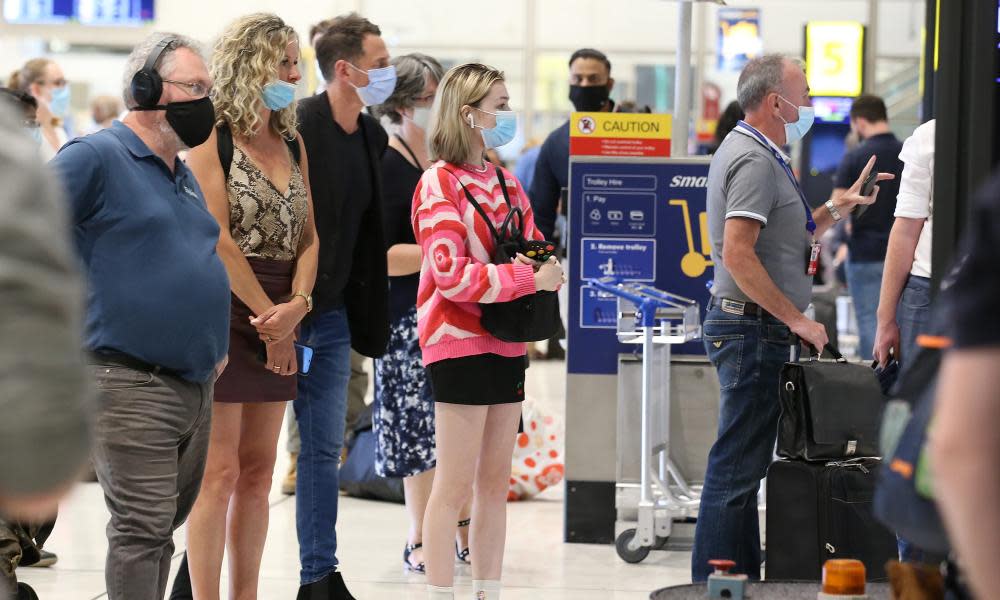Queensland Human Rights Commission flooded with inquiries due to Covid border confusion

Commissioner says lack of detail has ‘created a vacuum where misinformation is able to be spread’
The Queensland human rights commissioner, Scott McDougall, says the commission has received a spike in inquiries due to confusion about the state’s Covid border rules.
McDougall said that in the past few weeks, since the Queensland government announced its plans to reopen the state border, more than a third of inquiries had been about Covid issues as a lack of detail had “created a vacuum where misinformation is able to be spread”.
“We’re very much aware of the confusion and the lack of clarity for people trying to make sense of our border reopening plans,” McDougall told Guardian Australia.
“Since they were announced a couple of weeks ago Covid issues have been the subject of over a third of all our inquiries – at times nudging 40% – and almost all those are in relation to the restrictions after borders reopen.
Related: Queensland maintains travellers to state must get $150 Covid test
“Last financial year Covid issues accounted for about 16% of our inquiries, so it’s a big shift.”
The state government’s border plan “to unite families” is not a public health direction. Queensland Health said last week it was “a guide”. The situation has created uncertainty for people making plans to enter Queensland and for businesses attempting to navigate rules that ban unvaccinated people from various premises.
“Without a published health direction to accompany the government’s announcement, responding to the obvious demand for information has been really challenging for us,” McDougall said.
“Because we don’t have the detail about how the requirements will be applied, whether there will be exceptions and how people might seek them out, and what obligations will fall on business.
“I do really sympathise with business owners trying to navigate this in preparation for the borders reopening. It’s incredibly challenging for them to know what their responsibilities are to their staff and to their customers and for them to make the necessary preparations – or even know if they need to – without the detail being available.”
“The lack of detail about how the restrictions might apply doesn’t just confuse people, it also creates a vacuum where misinformation is able to be spread – not always by people with good motives – and has a greater chance of taking hold, which I believe is what we are seeing in parts of Queensland and interstate”
The Queensland human rights commission has been calling for the government to publish reasons for health directions, including evidence to support them.
“It would greatly increase trust in government if this were available,” McDougall said.
“Embedding these sorts of things in primary legislation would also help. That is what the Victorian government is attempting to do at the moment, and obviously there is a strong backlash to that from some parts of the community, but what that would do would actually be to increase transparency and accountability, and create an obligation for much more rigorous human rights scrutiny than currently exists.
Related: Australia’s border to remain open to South Africa despite emergence of new Covid variant
“A more robust human rights analysis of some of these measures would also go a long way to finding more appropriate and responsive ways of applying restrictions.
“When it comes to things like this they need to be balanced and proportionate, but they also can’t be applied as a blanket rule, one size fits all.”
On Friday, the Queensland health minister, Yvette D’ath, admitted there had been some confusion about whether people attempting to enter Queensland would need to pay $150 for a suitable test after the state reached 80% double-vaccination.
D’ath said the borders were going to be open “very very soon” and that fully vaccinated people who had returned a negative PCR Covid test would be allowed to enter.
“We can’t just open [up the] floodgates to say everyone can come in,” she said.
“At the 80% mark, 20% of our population is unvaccinated, and that doesn’t include our children.”

 Yahoo News
Yahoo News 
